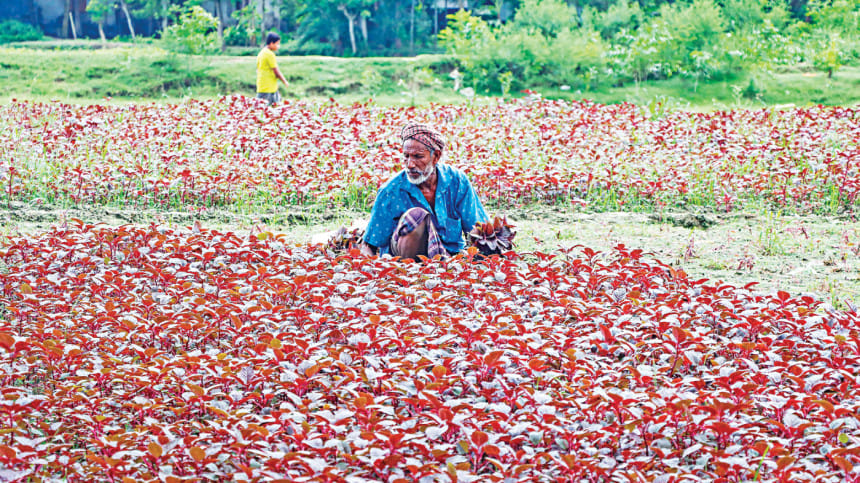Agri budget not enough to ensure food security: experts

The government has proposed a 3.55 percent rise in the budget allocation for agriculture, food, livestock and fisheries in the next fiscal year, setting aside Tk 39,620 crore.
But agro-economists say the increase is far from sufficient to ensure the country's long-term food security.
In his budget speech on Monday, Finance Adviser Salehuddin Ahmed announced Tk 27,224 crore for the agriculture ministry for fiscal year (FY) 2025–26.
This proposed allocation includes Tk 17,241 crore for subsidies on fertilisers and other farming inputs — a figure that remains nearly unchanged from the current fiscal year.
Agro-economists blame a mix of factors, including frequent floods, droughts and erratic rainfall, for the sector's declining contribution to GDP
Agri experts argue that the budget once again prioritises subsidies over much-needed investments in productivity. With Bangladesh set to graduate from the Least Developed Country (LDC) club in 2026, such subsidies will no longer be sustainable.
"If the current interim government did some groundwork in the FY26 budget towards the graduation, whoever comes to power next will have a footmark to follow," said M Asaduzzaman, former research director at the Bangladesh Institute of Development Studies (BIDS).
He suggested the budget should have outlined a one-year preparatory plan, laying the foundation for future policy shifts. "That could have then been a topic at least for discussion," he said.
Citing the urgency of improving yields, Asaduzzaman said paddy productivity in Bangladesh still falls below that of neighbouring India and Pakistan, where output is at least 30 percent higher.
"In Bangladesh, more attention has been paid to increasing subsidies over the years than to improving productivity," added the researcher.
According to a latest report by the Bangladesh Bureau of Statistics (BBS), the agriculture sector grew by just 1.79 percent in FY 2024–25, the slowest pace in more than a decade.
The sector's share of the country's gross domestic product (GDP) has also steadily declined, from over 38 percent in the early 1970s to just 11.3 percent in FY 2022–23, and further down to 10.94 percent in FY 2024–25.
Agro-economists and industry insiders blame a mix of factors, including frequent floods, droughts and erratic rainfall, all made worse by climate change.
Against this backdrop, the proposed budgetary allocation appears underwhelming, said agro-economist Jahangir Alam Khan. "If we want to ensure food security, reduce inflation and become self-reliant, the allocation must be increased," he said.
Echoing Asaduzzaman's call for improving productivity, Khan said that agricultural output must grow by 4 percent to 5 percent annually to meet the Sustainable Development Goals (SDGs) on food and nutrition security by 2030.
"With this paltry budget allocation, that's just not possible," he said.
He also pointed out that a farm mechanisation project offering subsidised machinery to farmers had shown promise, and it could have been relaunched in the new budget.
To ensure fair prices, Khan said the government should procure at least 20 to 25 key crops directly from farmers, which is now limited to only paddy and wheat.
Mohammad Jahangir Alam, professor of agribusiness and marketing at Bangladesh Agricultural University in Mymensingh, said the interim government, unburdened by political pressures, had a unique opportunity to offer a more forward-looking budget.
He was critical of the new budget for not having sufficient focus on agricultural research, which he said is key to reducing dependence on imports and achieving self-sufficiency.
"In previous budgets, a separate allocation was kept for research, but it is not in the proposed one," he added.
However, the budget does contain a few promising initiatives.
"The use of environment-friendly technologies is being promoted to reduce water waste during irrigation, improve the use of surface water and ensure sustainable use of groundwater," Alam said.
Other measures include strengthening cold storage supply chains and logistics systems, developing transport infrastructure for farm produce, creating a comprehensive database of agri supply chain actors, and establishing specialised agro-processing zones and port facilities for export.
In his budget speech, the finance adviser said that they have identified 59 bottlenecks to agri exports, and steps are being taken to address them.

 For all latest news, follow The Daily Star's Google News channel.
For all latest news, follow The Daily Star's Google News channel. 



Comments